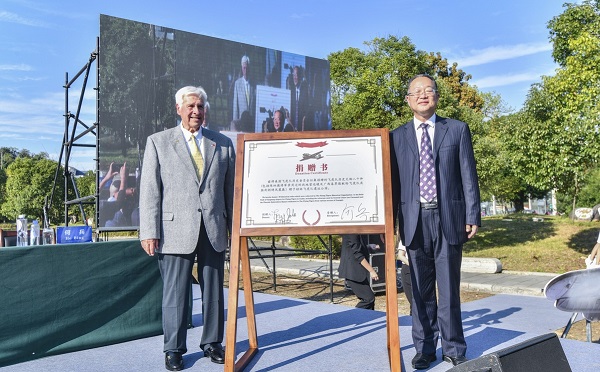Flying Tigers return to Chongqing, Guilin to rekindle friendship

The Flying Tigers Historical Association donated 80 relics to the Relic Park of Yangtang Airport for Flying Tigers on Tuesday in Guilin, Guangxi Zhuang autonomous region. [Photo by Wang Zhanfei/For chinadaily.com.cn]
Flying Tigers: Items donated to heritage park
Robin Olney got very emotional when she spotted her father, Richard, in a large group photo of the Flying Tigers on a wall of the Chongqing Stilwell Museum on Wednesday.
"It's a moment I will never forget. (To see my father's photo in Chongqing) warms my heart and I hardly have words for it," the 70-year-old woman told the media in front of her father's picture.
She hadn't expected to see her father's photo in Chongqing. "It is very special to come all the way around the world and see my dad here."
She is visiting China among a delegation composed primarily of Flying Tigers veterans and their family members.
In 1941, a group of volunteer US pilots, later known as the Flying Tigers, came to China, standing shoulder to shoulder with the Chinese people to fight the invading Japanese troops.
The 36-member delegation to Chongqing includes Flying Tigers veteran Harry Moyer, who turned 103 on Monday in Beijing, fellow Flying Tigers veteran Mel McMullen and Sino-American Aviation Heritage Foundation Chairman Jeffrey Greene.
In 1942, the Flying Tigers' headquarters were moved from Kunming, Yunnan province, to Chongqing in order to defend the airspace and security of the wartime capital of China, which was being heavily bombed by the Japanese.
At the Chongqing Stilwell Museum, which is dedicated to the late United States Army General Joseph Stilwell, the hero who also fought side by side with the Chinese people during the latter part of the War of Resistance Against Japanese Aggression (1931-45), the veterans sent flowers for the general's statue, toured the general's former residence and visited the photo exhibition about US air support to China during World War II.
After the visit to Beijing on Monday, the US delegation's whirlwind China tour included a trip to Guilin, Guangxi Zhuang autonomous region, on Tuesday, and they were to head to Kunming on Thursday.
Historical relics from US General Claire Lee Chennault, commander of the Flying Tigers, were donated on Tuesday to the Flying Tiger Heritage Park at Yangtang Airport in Guilin, a site that had served as a Flying Tigers command post.
"We must remember the past in forging ahead to a better future," said Larry Jobe, president of the Flying Tigers Historical Organization, as he expressed a desire to preserve the volunteer group's legacy.
The organization donated 80 items associated with the Flying Tigers.
In 2015, the Guilin city-level government built the park to commemorate the site's history and promote friendship between China and the United States.
"Collecting artifacts from this time period is getting harder every day as veterans pass on. Their mementos and treasures are often overlooked by the younger generation. Museums like the park in Guilin can help keep these memories alive," Jobe said.
Cynthia Louise Chennault, the daughter of General Chennault, brought a telescope used by her father in Guilin, along with an embroidered banner dedicated to the air unit.
